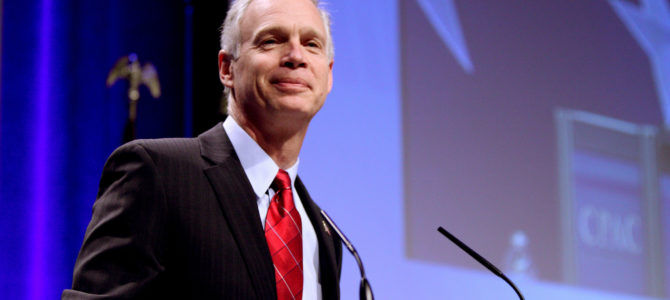Wisconsin Republican Senator Ron Johnson is pushing back on the Trump administration’s efforts to ban flavored electronic cigarette products as the White House plans to finalize new rules in the coming days to strip such products from the market.
In a letter sent to the president on Wednesday, Johnson argues that the new guidance issued by the Food and Drug Administration (FDA) would be devastating to local small businesses and public health, noting that there are an estimated more than 10,000 small businesses relying on the industry that could be forced to close as a result of the ban.
“The closure of these small businesses, including the loss of thousands of jobs, could essentially destroy this estimated $9 billion industry,” Johnson wrote.
Proponents of the White House measure are often quick to point out that only flavored products aimed at addicting young people will be removed from the market, allowing tobacco and menthol flavors to stay. Those who use the products however, note that removal of the more desirable flavors will still lead to a adverse impact on the industry and more importantly, public health.
Liz Sheld is a journalist living in the D.C.-metropolitan area who used to smoke traditional combustible cigarettes for more than 25 years before switching to vaping. Sheld said removing fruity flavors from the market would cause many ex-smokers to return smoking conventional cigarettes, noting that the tobacco and menthol flavors were not attractive enough to the addicted smoker.
“Tobacco is actually a disgusting flavor,” Sheld told The Federalist. “It’s not popular, it’s gross… nobody would use that to quit smoking because it tastes good.”
In his letter to the president, Johnson warns of the public health consequences such a ban could pose.
“If former smokers cannot access products that they have used to kick the habit, they could very well return to less healthy alternatives like smoking cigarettes or purchasing illicit products on the black market,” Johnson cautioned. “That outcome would be a public health disaster.”
A vaping scare in mid-October has already provided a glimpse into what could happen if the public were to run to products being sold on the black market when a mysterious lung disease impacted more than 2,000 people and killed at least 39, including teenagers. The Centers for Disease Control has attributed outbreak of the mysterious illness primarily to black market THC cartridges and is recommending that people stay away from all vaping products not sold by certified retailers.
“CDC continues to recommend that people should not use e-cigarette, or vaping, products that contain THC, particularly from informal sources like friends, or family, or in-person or online dealers.”
Further, Dr. Michael Siegel of the Boston University School of Public Health said that many living in states such as Massachusetts that have already implemented a ban on flavored vaping products have indeed returned to smoking traditional cigarettes as Johnson worries.
“We’re going to see this on a massive, massive scale and it’s going to have major public health consequences. What a tragedy that would be,” Siegel told The Federalist.
Use of electronic cigarettes has been shown to be the most successful form of smoking cessation and have been shown to be far safer than regular cigarettes, according to Siegel.
A recent study published earlier this year in the New England Journal of Medicine, shows that more than any other nicotine therapy currently available, e-cigarettes have been the most effective form of quitting cigarettes.
Still, the Trump administration has moved forward with its plans to issue FDA guidelines banning the sale of flavored products out of fears of breeding a new generation of nicotine addicted teens. The effort, which has received blowback from many in the industry has also even prompted resistance from the president’s own campaign.
President Donald Trump’s campaign manager, Brad Parscale, has privately urged the president to ease up on electronic cigarettes over fears that a ban on flavored products could impact the campaign. According to the Washington Post, internal campaign polling show supporters willing to abandon Trump if the administration were to follow through on implementing the guidelines.









